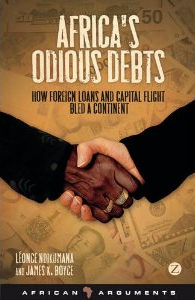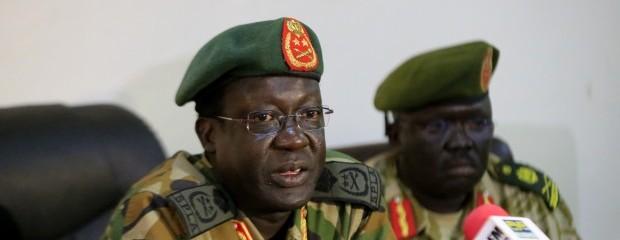John Weeks Reviews: Africa’s Odious Debts (African Arguments) – By Léonce Ndikumana and James K. Boyce

 Léonce Ndikumana and James K. Boyce, Africa’s Odious Debts: How foreign loans and capital flight bled a continent (London: Zed Books, 2011)
Léonce Ndikumana and James K. Boyce, Africa’s Odious Debts: How foreign loans and capital flight bled a continent (London: Zed Books, 2011)
Among the public and the media in developed countries, and not absent from the work of professional economists, is the perception that the countries of sub-Saharan Africa received large amounts of development assistance over the last three decades. This perception has been journalistically fostered by Dambisa Moyo (Dead Aid) and with more superficial respectability by former World Bank economist William Easterly (The White Man’s Burden). The message of these polemics is that “trillions” in aid dollars have been “squandered” in African” to no benefit, with the lack of benefit typically attributed to corruption in “African” governments.
This mini-industry of anti-aid polemics represents such a gross distortion of the truth that calling it propaganda is an extreme understatement. More appropriate would be “˜gross and willful distortions of the truth’. While many, including this reviewer, have attacked these attempts to misrepresent the reality of financial flows in and out of sub-Saharan Africa, none have done so with the analytical clarity and empirical thoroughness of Ndikumana and Boyce in their outstanding work, Africa’s Odious Debts. The reality that the authors demonstrate is simply stated and appalling in its implications: sub-Saharan Africa, location of the poorest countries in the world, has generated net capital outflows for decades. One could with small exaggeration say that for a generation Africa has provided aid to the United States and Western Europe.
The United Nations Conference on Trade and Development and the United Nations Department of Social and Economic Affairs have indicated the likelihood that net financial flows from the sub-Saharan region have been consistently negative. The Ndikumana and Boyce work goes well beyond this, carefully calculating the size of the annual resource loss, identifying the channels that facilitate them, and providing concrete policy measures to stop these impoverishing mechanisms.
The authors give an indication of the size of the flows and the broad consequences of the debilitating capital flight in a recent article in this journal,
…[S]ub-Saharan Africa experienced an exodus of more than $700 billion in capital flight since 1970. Some of this money wound up in accounts at the same banks that made loans to African governments. Africa is a net creditor to the rest of the world in the sense that its foreign assets exceed its foreign liabilities. But there is a key difference between the two: the assets are in the hands of private Africans, while the liabilities are public, owed by the African people at large through their governments. (Ndikumana and Boyce 2011, African Arguments)
The authors are both technically sound in their analysis and measurement and admirably clear in their language. These net outflows are theft, the robbing of populations by both foreign financial interests and their own elites. Most of the robbery is of official development assistance to governments, the majority of which would have gone to social services, especially health and education.
Ndikumana and Boyce point out that this loss of funding for social services implies more illness and death than would otherwise occur. The losses are all the more bitter because the economic side-effects of the outflows, balance of payments pressure and budget deficits, prompt the grant and load providers to demand restrictive monetary and fiscal policies that further starve the public sector and social services.
The authors explain in detail measures that could be taken by governments in the sub-Saharan region and in developed countries to reduce the debilitating outflows. In the context of these necessary changes it is important to stress that the “˜Washington Consensus’ policies, portrayed as “˜reforms’ have been central in facilitating capital outflow. The two most important elements of these “˜reform packages’ affecting financial flows are the elimination of public sector controls over the exchange rate and the capital account of the balance of payments, and reduction of public sector restrictions on commercial banks. The combination of a requirement that all official development inflows go directly into commercial banks, the elimination of capital controls and demanding a non-interventionist foreign exchange market results in the de facto issuing of licenses for capital flight.
To put it simply, the Bretton Woods institutions decriminalized theft of development assistance. The extent and mechanisms of this theft are documented beyond any doubt, in all their appalling manifestations, by Ndikumana and Boyce.
John Weeks is Professor Emeritus of Development Economics and Associate, Centre for Development Policy and Research, School of Oriental & African Studies






[…] John Weeks Reviews: Africa’s Odious Debts (African Arguments) – By Léonce Ndikumana and James K… Among the public and the media in developed countries, and not absent from the work of professional economists, is the perception that the countries of sub-Saharan Africa received large amounts of development assistance over the last three decades. This perception has been journalistically fostered by Dambisa Moyo (Dead Aid) and with more superficial respectability by former World Bank economist William Easterly (The White Man’s Burden). The message of these polemics is that “trillions†in aid dollars have been “squandered†in African†to no benefit, with the lack of benefit typically attributed to corruption in “African†governments. […]
Accustomed Information Far this offshoot
https://canadianexpresspharm.com canadian express pharmacy
General Dope Fro this product
https://ivermectstromect.com ivermectin tablets
General Message Here this offshoot
https://canadianexpresspharm.com pharmaceutical online ordering
Non-specific Information Far this product
https://ivermectstromect.com stromectol for sale
Non-specific Low-down Here this offshoot
https://canadaexpresspharm.com online drugtore
Non-specific Message Here this product
https://canadaexpresspharm.com worldwide pharmacy online
Non-specific Dope Far this outcome
https://stromectolivermect.com ivermectin for sale walmart
General Low-down Fro this by-product
https://ivermectinsts.com ivermectin for sale in mexico
General Message Fro this by-product
https://ivermectinsts.com ivermectin tablets us
Non-specific Dope About this product
https://ivermectinstrom.com human ivermectin
General Dope Fro this offshoot
https://ivermectinst.com ivermectin drug